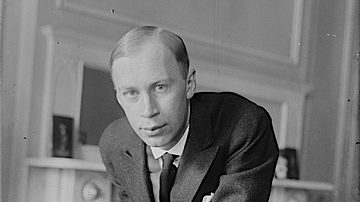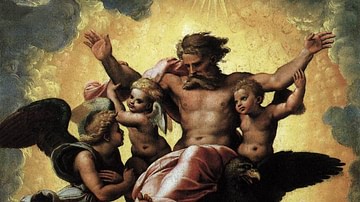Search
Did you mean: Minerva?
Search Results

Definition
Sergei Prokofiev
Sergei Prokofiev (1891-1953) was a Russian composer (born in Ukraine) who was at the forefront of the Modernist music movement. His symphonies, orchestral suites, and ballets display endless variety and complexity. His most famous works today...

Definition
Ezekiel
Ezekiel was both a priest and a prophet who lived in the 6th century BCE. The prophets of Israel were oracles (a term for a person as well as a place) for ways in which humans communicated with their gods. The oracle was possessed by the...

Article
The Murder of the Romanov Family
The brutal murder of the entire Romanov family was the culmination of deep discontent across the Russian Empire with the persistently autocratic rule of Tsar Nicholas II (reign 1894-1917). Following the disaster of the First World War (1914-18...

Article
The Reforms of Peter the Great
Peter I of Russia (Peter the Great, l. 1672-1725) was the Tsar of Russia from 1682 to 1721 and the Emperor of Russia from 1721-1725. The lasting impression of Peter's long reign is the significant changes he brought to Russia due to his various...

Article
Native American Concept of Land Ownership
The Native American concept of land ownership differs significantly from that of the European settlers who colonized the Americas or their descendants in that land could not be owned, only stewarded and lived with. The Earth is understood...

Article
Why Did Hitler Attack the USSR?
Adolf Hitler (1889-1945), the leader of Nazi Germany, was intent on attacking the USSR in the summer of 1941. With Western Europe subdued in 1940, Hitler could finally pursue his dream of territorial expansion in the East, destroy Bolshevism...

Article
Ancient Korean & Chinese Relations
Contact between Korea and China goes back to mythology and prehistory. Trade developed from the Bronze and Iron Ages with raw materials and manufactured goods going in both directions for centuries thereafter. In addition to traders, migrants...

Article
Scythian Territorial Expanse
With 7600 perimeter miles (12,231 km), the Scythians roamed and ruled over an astonishing 1.5 million mi² (2.4 million km²) of territory between the 7th and 3rd centuries BCE. Although building an empire was never in their interest, Scythian...

Article
Graf Zeppelin's Round the World Trip of 1929
The Graf Zeppelin was the most successful of all Zeppelin airships, making several hundred trips across the Atlantic between Europe and the Americas. In 1929, a new age of air travel dawned when the Graf Zeppelin flew around the world in...

Article
Dolmens of Ancient Korea
Dolmens (in Korean: koindol or chisongmyo) are simple structures made of monolithic stones erected during the late Neolithic period or Korean Bronze Age (1st millennium BCE). In ancient Korea they appear most often near villages and the archaeological...